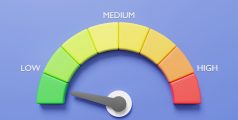
How to Check Your CIBIL Score When Applying for a Personal Loan
Posted on Monday, May 27th, 2024 | By IndusInd Bank
Thinking about applying for a personal loan? One of the first things lenders check before approving your application is your CIBIL score. Whether it’s for a home renovation, medical emergency, or dream vacation, your creditworthiness plays a key role in getting quick approvals and better loan terms.
Your CIBIL score acts like a financial report card. It helps banks and financial institutions decide if you’re reliable when it comes to borrowing and repayment. Let’s understand what it is, how it works, and why keeping it healthy is essential for your financial goals.
What is a CIBIL Score?
Your CIBIL score, also known as your credit score, is a three-digit number ranging from 300 to 900, calculated based on your credit history and repayment behavior. It serves as a measure of your creditworthiness and indicates the likelihood of you repaying your debts on time. Lenders use your CIBIL score to assess the risk of lending to you and determine the terms of the loan, including the interest rate, loan amount, and repayment tenure.
Simply put, the CIBIL score is a summary of how well you’ve handled credit in the past—and it matters a lot when you’re applying for a personal loan.
How CIBIL Score Works
Your CIBIL score is calculated using the information in your Credit Information Report (CIR), which is updated regularly by banks and financial institutions. Key components that impact the score include:
- Repayment history: Timely payments on loans and credit cards help build a good score
- Credit utilization ratio: Using a high percentage of your available credit limit can negatively affect your score
- Credit mix: A balanced mix of secured (home/car loans) and unsecured loans (personal loans/credit cards) is considered healthier
- Number of hard inquiries: Frequent applications for loans or credit cards can hurt your score
- Length of credit history: Older credit accounts show long-term responsibility
Each of these factors contributes to a weighted average that forms your final CIBIL score.
Checking Your CIBIL Score
Before applying for a personal loan, it’s essential to know your CIBIL score to understand where you stand in the eyes of lenders. Here’s how you can check your CIBIL score:
1. Visit the CIBIL Website: The Credit Information Bureau (India) Limited (CIBIL) is one of the leading credit bureaus in India. You can check your CIBIL score by visiting the official CIBIL website and following the instructions to request your credit report.
2. Provide Personal Information: To access your CIBIL score, you’ll need to provide personal information such as your name, PAN, date of birth, address, and identification details. You may also need to answer security questions to verify your identity.
3. Review Your Credit Report: Once you’ve requested your CIBIL score, you’ll receive a detailed credit report that includes information about your credit history, outstanding debts, repayment behavior, and any negative remarks or defaults. Review your credit report carefully to identify any errors or discrepancies that may affect your CIBIL score.
4. Understand Your Score: Your CIBIL score will fall within a specific range, with higher scores indicating better creditworthiness. Generally, a CIBIL score of 750 or above is considered good and increases your chances of loan approval with favorable terms. If your score is below 750, you may need to take steps to improve it before applying for a personal loan.
What is a Good CIBIL Score?
A good CIBIL score can make all the difference when applying for a personal loan. Here’s a general breakdown:
- 750 – 900: Excellent – High approval chances and better loan terms
- 700 – 749: Good – Eligible for most loans, but might not get the lowest interest rate
- 650 – 699: Fair – May face stricter scrutiny or slightly higher interest rates
- 600 – 649: Poor – Limited chances of loan approval
- Below 600: Very Poor – Likely to face rejections or need a guarantor/co-applicant
While different lenders may have their own criteria, 750+ is usually considered ideal for personal loan applications.
Importance of CIBIL Score in Personal Loan Application
Your CIBIL score plays a crucial role in the personal loan application process and can significantly impact your ability to secure financing. Here’s why your CIBIL score matters:
1. Loan Eligibility: Lenders use your CIBIL score to determine your eligibility for a personal loan. A higher CIBIL score indicates lower risk to the lender and increases your chances of loan approval.
2. Interest Rates: Your CIBIL score influences the interest rate offered by lenders. Borrowers with higher CIBIL scores are typically offered lower interest rates, saving money on interest payments over the life of the loan.
3. Loan Amount: Lenders may use your CIBIL score to determine the maximum loan amount you qualify for. A higher CIBIL score may result in a higher loan amount, allowing you to borrow more to meet your financial needs.
4. Repayment Tenure: Your CIBIL score can also affect the repayment tenure offered by lenders. Borrowers with higher credit scores may be eligible for longer repayment tenures, resulting in lower monthly payments and greater flexibility in managing loan repayments.
Also Read – How to Apply Online for Personal Loans?
Tips for Improving Your CIBIL Score
If your CIBIL score is lower than desired, there are steps you can take to improve it before applying for a personal loan:
1. Pay Bills on Time: Ensure timely payment of credit card bills, loan EMIs, and other outstanding debts to demonstrate responsible repayment behavior.
2. Reduce Debt Burden: Pay down existing debts and keep credit card balances low to improve your credit utilization ratio, a key factor in calculating your CIBIL score.
3. Limit Credit Inquiries: Minimize the number of credit inquiries and avoid applying for multiple loans or credit cards within a short period, as this can negatively impact your CIBIL score.
4. Review Credit Report: Regularly review your credit report for errors or discrepancies and dispute any inaccuracies with the credit bureau to ensure your CIBIL score is based on accurate information.
To Conclude
Your CIBIL score plays a crucial role in your financial journey, especially when it comes to unsecured credit like personal loans. Understanding how it works, checking it regularly, and taking steps to improve it can help you secure faster approvals, better interest rates, and higher loan amounts.
Getting access to your credit report is simple and free. Whether you’re planning to take a personal loan now or in the future, keeping your CIBIL score in check is one of the smartest financial habits you can develop.



 Offers
Offers Rates
Rates Debit Card Related
Debit Card Related Credit Card Related
Credit Card Related Manage Mandate(s)
Manage Mandate(s) Get Mini Statement
Get Mini Statement
 categories
categories Bloggers
Bloggers Blog collection
Blog collection Press Release
Press Release


